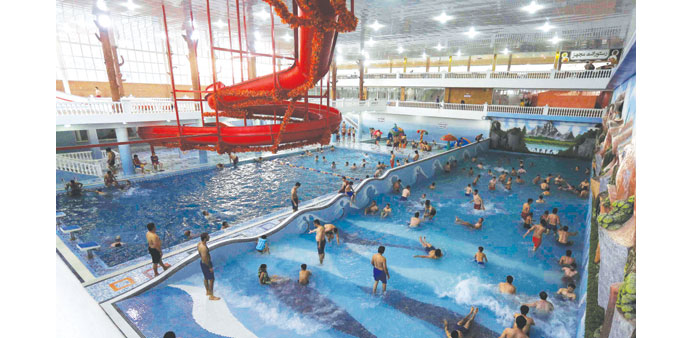Reuters /Kabul
After the armed guards and body search at the door, it is almost easy to forget the fun is happening in ultra-conservative Afghanistan, except that all of the people leaping down the colourful slides and splashing in the water are men.
Inside a non-descript building in central Kabul, residents of the battle-hardened capital have a new and unusual form of escape - a state-of-the-art water park.
“They have really built a very good pool. I can’t believe it,” said one visitor, Fahim Maeel, a company manager.
The creators of the novel $5mn endeavour are among the few in Kabul not wringing their hands over Afghanistan’s future after 2014 when foreign combat troops are due to leave.
“When we decided to build this place, we knew that 2014 was to come,” said Mahmod Najafi, one of Kabul Water Park’s managers and shareholders. “For us 2014 doesn’t mean anything.”
Just over a year ago, Najafi and three partners pooled their cash to build the venue on a 2,300-square-metre plot near the parliament building.
In addition to towering slides, there is a huge wave pool eliciting noisy delight from adult swimmers that one might expect from children visiting the beach for the first time. The men wear swim shorts but no slingshot-style suits were in sight.
In a city where the average wage is about $50 a week, a thriving middle class can afford the admission price of 500 Afghanis ($9).
“I am really proud when I see such developments,” said Fahim Khan, a 26-year-old university student.
The popular facility, which can handle up to 1,000 customers at a time, also has a restaurant, whirlpool, sauna and lavish play area for young children, including girls who are allowed to mix with the opposite sex until the age of about 10.
Women have made progress in education, health and work in a conservative Muslim society but most still wear the head-to-toe burqa enforced by the Taliban when the fundamentalist movement ruled Afghanistan from 1996 to 2001. Segregation of the sexes and limits on the public activities of women remain the norm.
With Afghanistan heavily dependent on foreign aid, ventures like the Kabul Water Park are a rare but reassuring sign that the economy may be able to sustain itself as donations shrink.
“We have provided jobs for 70 people and we have provided a good environment for our young generation,” Najafi said.
“My message to other Afghan businessmen is that if we don’t invest because of concerns about 2014, we will remain backward. Every Afghan has to work individually to promote this country.”
Voters are due to elect a new president in April in what many hope will mark Afghanistan’s first democratic transfer of power. But the cast of former warlords as candidates and unusual alliances have provoked concern among human rights groups.
President Hamid Karzai, in power since US-led coalition forces ousted the Taliban in 2001, is barred by the constitution from running for a third term but his older brother Qayum has registered as a candidate.

People swim and play around at a public swimming pool in Kabul.
